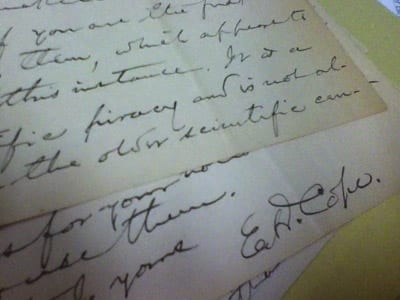Science journalist David B. Williams, who writes for Earth magazine, covered the research of SMU vertebrate paleontologist Louis L. Jacobs and the infamous Bone Wars of the late 1800s.
See an SMU video and press release about the research, “Texas frontier scientists who uncovered state’s fossil history had role in epic Bone Wars.”
The Bone Wars was a flurry of fossil speculation across the American West that escalated into a high-profile national feud. Drawn into the spectacle were two scientists from the Lone Star State, geologist Robert T. Hill, now acclaimed as the Father of Texas Geology, and naturalist Jacob Boll, who made many of the state’s earliest fossil discoveries.
The article, “Long-Lost Letters Shed New Light on 19th-Century Bone Wars,” was published in the January 2013 issue of Earth.
Hill and Boll had supporting roles in the Bone Wars through their work for one of the feud’s antagonists, Edward Drinker Cope, according to Jacobs’ new study.
A professor in Dedman College‘s Roy M. Huffington Department of Earth Sciences, Jacobs joined SMU’s faculty in 1983.
Currently his field projects include work in Mongolia and Angola. His book, “Lone Star Dinosaurs” (1999, Texas A&M University Press) was the basis of an exhibit at the Fort Worth Museum of Science and History that traveled the state. He consulted on the new exhibit, Mysteries of the Texas Dinosaurs, which opened in 2009.
EXCERPT:
By David B. Williams
Earth
In the decades following the Civil War, America became the center of the fossil world through discoveries by paleontologists Othniel Charles Marsh and Edward Drinker Cope, one-time friends turned bitter enemies. Out of their nasty, well-financed battle to dominate the world of paleontology came legendary dinosaur finds such as skeletons of Brontosaurus (now known as Apatosaurus), Stegosaurus, Triceratops, and Allosaurus. The finds weren’t just a bone or two of each dinosaur, as had been the case in the early years of dinosaur discoveries in England; rather, these were nearly complete skeletons that for the first time shed light on the incredible diversity of dinosaurs.The so-called Bone Wars entailed this lifelong race between Marsh and Cope to discover the most new fossils, during which both paleontologists risked their scientific integrity as well as their financial well-being. The field skirmishes between Cope and Marsh mostly occurred in Colorado and Wyoming (and mostly among their hired help), but one of the lesser-known side squabbles took place in Texas. New evidence from recently discovered letters from Cope to field collector Robert T. Hill reveals more about the nature of the conflict and its contributors.
Follow SMU Research on Twitter, @smuresearch.
For more SMU research see www.smuresearch.com.
SMU is a nationally ranked private university in Dallas founded 100 years ago. Today, SMU enrolls nearly 11,000 students who benefit from the academic opportunities and international reach of seven degree-granting schools. For more information, www.smu.edu.
SMU has an uplink facility located on campus for live TV, radio, or online interviews. To speak with an SMU expert or book an SMU guest in the studio, call SMU News & Communications at 214-768-7650.




 Observed! SMU’s LHC physicists confirm new particle; Higgs ‘God particle’ opens new frontier of exploration
Observed! SMU’s LHC physicists confirm new particle; Higgs ‘God particle’ opens new frontier of exploration DOE Award: advancing SMU’s link to the God particle
DOE Award: advancing SMU’s link to the God particle